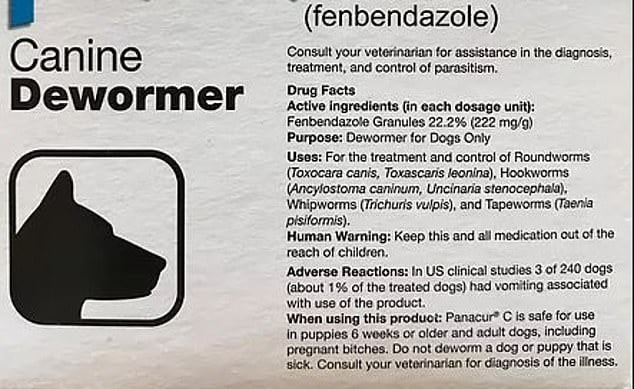An Oklahoma man who was once diagnosed with small-cell lung cancer and told hat he only had three months live claims he is now tumor-free thanks to a $5 deworming drug usually meant for dogs.
Joe Tippens was diagnosed with small-cell lung cancer in 2016. Despite undergoing treatment for the disease, by January of 2017, the cancer had spread to other organs, including his stomach, neck, pancreas and even his bones. The cancer was everywhere and doctors advised him to go home and say his goodbyes because he only had three months to live. When small-cell cancer spreads as wide as it had in his case, the chances of survival are around one percent. Tippens thought he was going to die, and with nothing left to lose, he was willing to try anything in hopes of a miracle, even a dog dewormer called fenbendazole.
The desperate cancer sufferer stumbled upon the bizarre treatment while browsing a forum of his alma mater, Oklahoma State University. The post that caught his eye read “If you have cancer or know someone who does, give me a shout”. Joe had already signed up for an experimental treatment that doctors said wouldn’t save him but might extend his life expectancy from three months to a year, enough to at least meet his grandson. But he decided that contacting that forum poster couldn’t hurt either. To his surprise, that person was a veterinarian who had a very interesting story to tell.

The vet told Joe that scientists had accidentally discovered that a dog de-worming drug seemed to attack cancer cells in mice. One of the scientists who conducted the research had been diagnosed with stage 4 brain cancer and had been giving the same grim prognosis as Joe, but she started popping dog deworming pills and within six weeks her cancer was gone. Obviously, Joe was intrigued.
Tippens stayed in the clinical trial his doctors had suggested, but also placed an order for fenbendazole, the canine drug the veterinarian mentioned. He didn’t tell his physicians about it though. Three months later, when he had another PET scan to check the spread of his cancer, he was shocked to learn that there was no sign of the tumors anywhere in his body.
“Three months earlier…There was cancer in my body from head to toe. And it was a terrifyingly dangerous metastasis that leaves virtually 100% of its victims dead within 3 months,” Joe said. “Here I was 3 months later and the PET scan was completely dark……void of any light…..anywhere.”
In September 2017, Joe went for yet another scan which again showed he was cancer-free. This time he told his doctor about the fenbendazole, but there was no way to prove that the deworming drug had cured him. He had also been taking vitamin E supplements, CBD and bioavailable curcumin, plus there was also the clinical trial the doctors suggested. The funny thing about that experimental drug was that out of the 1,100 patients on that clinical trial, Joe was the only one cleared of cancer.

Photo: Stevebidmead/Pixabay
“My insurance company spent $1.2 million on me with traditional means before I switched to a $5 a week medicine that actually saved me,” Joe said, making sure to mention that he is not a doctor. “I am not prescribing medicine and I am not qualified to give advice on medical treatments. BUT…..I am qualified to tell my story to as many people as possible.”
Joe Tippens story has caught the attention of the president of the Oklahoma Medical Research Foundation, Dr Stephen Prescott, who said he is working on case study report about the cancer-fighting properties of fenbendazole.
“We’re going to do it and see if we can confirm, in a very rigorous and clinical sort of way, that these patients had that kind of response,” Prescott said. “I’m usually sceptical, and I was and maybe still am about this one, but there’s interesting background on this.”
Tippens, who is still cancer free, says he has at least 40 success stories other than his, all of which involve the use of fenbendazole. There are also studies that suggest the compound essentially starves cancer cells and kills them. Still, many doctors are sceptical about the drug and recommend that patients stick to classical treatments. Tippens himself has been accused of giving cancer patients false hope, but he seems unfazed by critics.
“Oh, how do I answer that? I mean, if I’ve saved one other person other than me, it’s worth it to me,” he told KOKO News, adding that he plans to take fenbendazole for the rest of his life.






